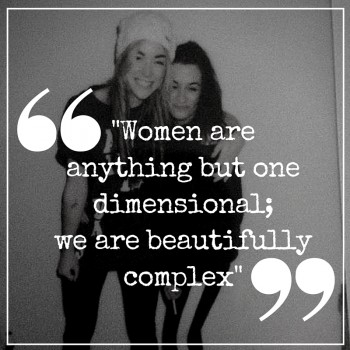Engender blog
Women-only leadership: progressive or discriminatory?
A very familiar question was raised again this week: should
women-only
 organisations, women-only services, and women-only governance and leadership
be lauded as progressive or shunned as discriminatory? Several media outlets reported on the fact
that Moray Women’s Aid has elected to leave the Scottish Women’s Aid network. The
local women’s aid is in contravention of its network’s shared commitment to
individual services being governed and staffed by women, having confirmed that
is has at least one man on its board of directors, Cllr Graham Leadbitter.
organisations, women-only services, and women-only governance and leadership
be lauded as progressive or shunned as discriminatory? Several media outlets reported on the fact
that Moray Women’s Aid has elected to leave the Scottish Women’s Aid network. The
local women’s aid is in contravention of its network’s shared commitment to
individual services being governed and staffed by women, having confirmed that
is has at least one man on its board of directors, Cllr Graham Leadbitter.
“We disaffiliated ourselves because we were not prepared to discriminate blatantly,” Moray Women’s Aid’s manager, Elle Johnston, was reported as saying in the Herald. Catriona Stewart, Glasgow Women’s Aid board member and journalist, took very public aim at the policy in another piece in the Herald, describing it as “a rigid model that threatens to weaken the network and refuses to allow for evolution as society evolves.”
The notion of women-led services has been framed in much of the coverage as backwards, inflexible, and an impediment to the very equality that feminists purport to want. So is Scottish Women’s Aid’s policy discriminatory? And what is the point of women-only feminist leadership anyway?
In her piece, Stewart asks whether having men on Moray Women’s Aid has been effective: "Has it done any good, should be the test?" A paper from Moray Council suggests that the original vision for Moray Women’s Aid governance was almost as an arms-length organisation of the local authority, with two elected members as executive directors and a further three serving on the board. That plan was shelved, but unusually, Cllr Leadbitter was nominated directly by the council onto Moray’s board as it was established. According to its annual accounts, Moray Women’s Aid board was majority male or fifty-fifty between its incorporation in 2008 and 2013, which means that decision-making was possible for most of those years by an all-male quorum. While Moray Women’s Aid certainly delivered vital services during this time, its account of itself gives the impression that it lacked some of the governance that might, for example, have enabled it to meet some of the digital demands of 21st century service delivery. Its 2015 accounts plead for a “knowledgeable computer expert” to help keep its internal systems up to date, and it doesn’t have a website. Other strategic decisions made by the board run contrary to the gendered analysis in Scotland’s bold new violence against women strategy, Equally Safe. It says that it has redesigned its logo to “encapsulate a more generic outlook, while still focusing on the needs of women and children”.
But it is on the needs of women and children that the call for feminist, women-only governance and leadership rests.
Five reasons that media coverage of the pay gap is so bad (and why we think we should do better)
Yesterday saw the repeat of a ritual that happens a handful of times a year. An organisation - in this case the Chartered Management Institute - produces a figure it describes as a gender pay gap. News outlets contact organisations working on gender, or women and work, to ask for short quotes that explain both the pay gap and how we're going to fix it. These quotes are then strung together into pieces that are shaky on the facts and slight on analysis. In recent years, as the tenor of public discourse has softened slightly towards women's equality, they've been complemented by editorials denouncing the glacial rate at which the gap is narrowing. A couple of columnists may even take a swing at some particularly egregious examples of workplace discrimination, before the whole subject is unceremoniously bundled into an archive folder to wait for the next pay gap news release.
So why is there such fleeting, insubstantial coverage of this most pressing of gendered concerns? Why are we not having a grand conversation about women and work?
Sexism in advertising, what can we do?
Caroline, Engender's recently recruited Membership Engagement Assistant, explores the effects of sexism in advertising and looks at how we can challenge gender inequality within the media.

I like to think it is now no secret that marketing communications shape the way in which women view themselves and the way that society views women. Advertising agencies (and the media) dictate our perceptions of beauty; creating unobtainable standards and enabling the fashion and beauty industry to capitalise on our insecurities. Is there anything we can do to stop these damaging portrayals of women?
Gender Matters in Media and Culture
For many people, popular culture and the media is the first indication that maybe, just maybe, we don’t have women’s equality yet. The women we see on screen and in print are often stereotyped or tokenistic, or we don’t see them at all. And of course the situation is worse for older women, women of colour, disabled women, lesbian and trans women. One thing women across Scotland have told Engender is that the media, both in print and on screen, can play a huge role in perpetuating women’s inequality.
Guest Post: Women, Westminster, and the media
Guest post by Juliet Swann, Campaigns and Research Officer at the Electoral Reform Society in Scotland.
Working for ERS Scotland I am often asked to comment on women and political life and the equal representation of women. I am also often asked to speak or chair events, and often I have been approached because I am a woman.
This was explicitly the case in three general election events I participated in last month. The first was a Common Weal Edinburgh North and Leith hustings, where they were keen to have the debate chaired by a woman. Equal representation came up in the discussion, not just for women but also for other under-represented groups such as BME and people with disabilities.
Downloads
 Engender Briefing: Pension Credit Entitlement Changes
From 15 May 2019, new changes will be introduced which will require couples where one partner has reached state pension age and one has not (‘mixed age couples’) to claim universal credit (UC) instead of Pension Credit.
Engender Briefing: Pension Credit Entitlement Changes
From 15 May 2019, new changes will be introduced which will require couples where one partner has reached state pension age and one has not (‘mixed age couples’) to claim universal credit (UC) instead of Pension Credit.
 Engender Parliamentary Briefing: Condemnation of Misogyny, Racism, Harassment and Sexism
Engender welcomes this Scottish Parliament Debate on Condemnation of Misogyny, Racism, Harassment and Sexism and the opportunity to raise awareness of the ways in which women in Scotland’s inequality contributes to gender-based violence.
Engender Parliamentary Briefing: Condemnation of Misogyny, Racism, Harassment and Sexism
Engender welcomes this Scottish Parliament Debate on Condemnation of Misogyny, Racism, Harassment and Sexism and the opportunity to raise awareness of the ways in which women in Scotland’s inequality contributes to gender-based violence.
 Gender Matters in Social Security: Individual Payments of Universal Credit
A paper calling on the Scottish Government to automatically split payments of Universal Credit between couples, once this power is devolved to the Scottish Parliament.
Gender Matters in Social Security: Individual Payments of Universal Credit
A paper calling on the Scottish Government to automatically split payments of Universal Credit between couples, once this power is devolved to the Scottish Parliament.
 Gender Matters Manifesto: Twenty for 2016
This manifesto sets out measures that, with political will, can be taken over the next parliamentary term in pursuit of these goals.
Gender Matters Manifesto: Twenty for 2016
This manifesto sets out measures that, with political will, can be taken over the next parliamentary term in pursuit of these goals.
 Scottish NGO Briefing for UN Special Rapporteur on Violence Against Women
Joint briefing paper for the UN Rapporteur on Violence Against Women.
Scottish NGO Briefing for UN Special Rapporteur on Violence Against Women
Joint briefing paper for the UN Rapporteur on Violence Against Women.

Newsletter
Sign up to receive our newsletter here:
Sign up to our mailing list
Receive key feminist updates direct to your inbox: